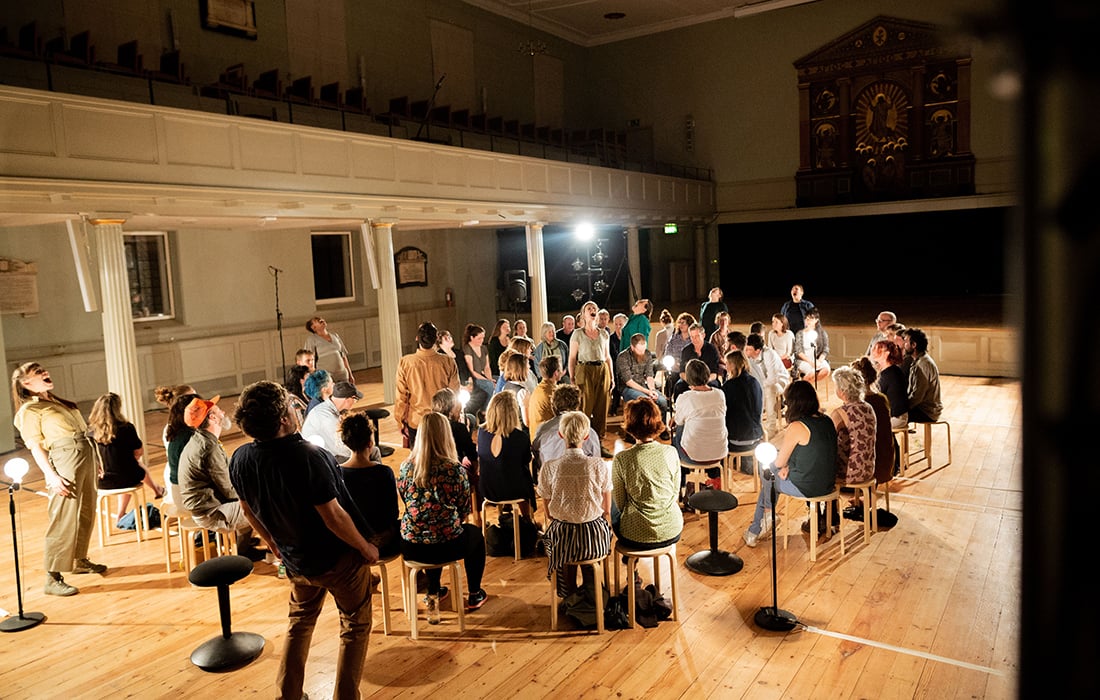
'Undersong' by Verity Standen - one of the shows due to be programmed at Mayfest.
Photo: Paul Blakemore
Learning the art of ‘un-producing’
How are small theatre companies living through the current crisis – and what does the future hold for them? Matthew Austin's experiences will be all too familiar to many.
When MAYK Theatre met with other participants in the West of England Combined Authority’s 'Creative Scale Up' programme earlier this year – aimed at helping creative organisations grow – there were a couple of jokes about coronavirus. One of the participants made us all greet each other by tapping our ankles together. None of us had any idea how completely devastating the virus would become. It felt like something that might be a bit of an inconvenience for a while. But within just a few weeks, the pandemic has presented unique challenges to everyone who is in the business of bringing people together.
Then and now
As the lockdown began we were in the final stages of preparing for our biennial festival, Mayfest. It's an international festival of theatre that welcomes people from all over the world to Bristol for three weeks of shows, parties and conversation. We were excited about this year’s programme. The work shared a preoccupation with resilience, with fighting back from trauma. It celebrated what it means to come together and celebrate being human. Little did we know how vital that would feel in the coming weeks. And how much we'd miss it.
Last week we had another Creative Scale Up cohort session, this time over Zoom. It was a radically different conversation. Gone were chats about expanding teams, delegation and creating a company culture. Instead, we were talking about furloughing staff, government loans, the challenges of working from home. The person moderating the session kept trying to bring us back to our own companies, but the conversation would immediately go meta again. We talked about economics and geopolitics. About how perhaps this was an opportunity to completely reshape how the world works.
'Un-producing' first
It feels like growth is now quite far down the list. It’s been replaced at the top by survival. About whether the concept of growth was even acceptable anymore. Can we think about growth in terms of social objectives rather than financial? Do the two come hand in hand?
Our day-to-day work since the lockdown began has been unlike ever before. Our days are filled with rewriting budgets, talking to our board, managing our staff team remotely, trying to understand how projects we postponed might be re-staged at some point in the future and so on.
But now the immediate fire-fighting, or what David Grieg described as ‘un-producing’ of all our current projects is largely complete, we find ourselves reflecting on what will forever remain un-experienced, un-seen, un-enjoyed by our audiences. And we’re looking further ahead at what feels like a huge void of unknowns.
While MAYK is fortunate not to have the yoke of a large building with huge overheads and a large staff team round our necks, we are reliant on many different partnerships with many different organisations, all of whom are navigating this in their own ways. We are not an island; we are part of a huge network, and at the moment it’s unclear which parts of that network are going to survive and which will disappear.
While in the short term we can pause, reflect and regroup, it’s when we look to the second half of this financial year and beyond that things look hairy. How does a producing company tour work when the artists we work with can’t yet apply for funding? How do we work with our partners in Bristol to stage the work in the Mayfest programme when it’s unclear when they’ll reopen and what their programmes will look like? Where is the space to start developing new ideas that aren’t about responding to the immediate crisis, but that will emerge in 18 months or 2 years?
No going back
But right now, we want to be in the bar with our festival audiences talking to them about what they’ve just seen, or what they’re about to see. We want to be showing artists our beautiful city. We want to be in a room with lots of people clapping, cheering, laughing and crying.
We’re also thinking about what our responsibility is towards individual artists and freelancers. We’re a small Band 1 NPO with very limited resource. We can’t offer cash, but we can offer time to talk, listen, corral. We can use our networks to advocate for the needs of those artists to larger organisations, to funders, to decision-makers.
Of course, amidst all of this we’re aware that whilst the impact on the cultural sector is undoubtedly enormous, we are watching the news each day in horror at the devastation this virus is causing to families and individuals all over the world. Our collective responsibility has to be on physical, mental and social healing.
It feels like we have a rare moment when we all emerge from this to redraw the map and rewrite the rules. It seems clear to us that going to back to how things were is not only undesirable, but probably impossible. If we can collectively hold some space for us all to create the future together then perhaps some of the problems we faced as a cultural sector and a society as a whole can be solved or removed. But it feels like the opportunity for proper change will be brief – we have to grab it.
Matthew Austin is Co-Director of MAYK
www.mayk.org.uk | www.mayfestbristol.co.uk
Join the Discussion
You must be logged in to post a comment.